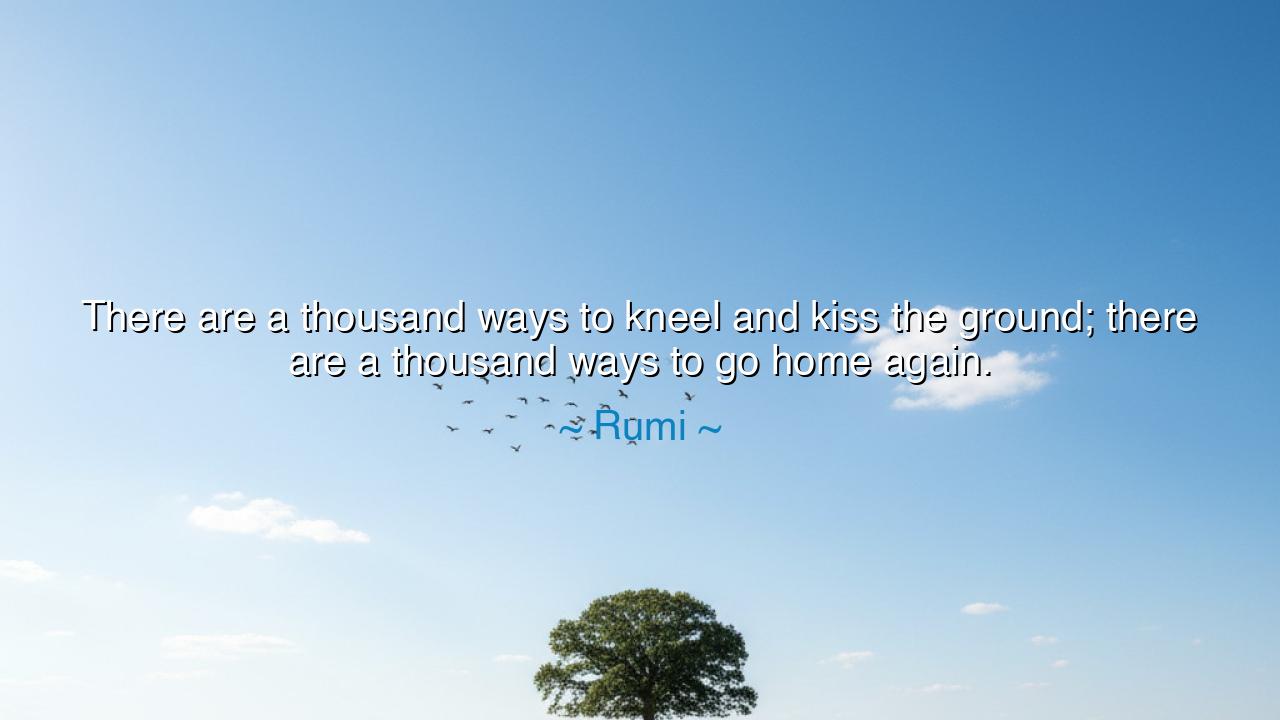
There are a thousand ways to kneel and kiss the ground; there are
There are a thousand ways to kneel and kiss the ground; there are a thousand ways to go home again.






"There are a thousand ways to kneel and kiss the ground; there are a thousand ways to go home again." — so spoke Jalal al-Din Rumi, the mystic poet whose heart burned with divine love. In these few words lies a universe of meaning — a truth that humbles the proud and comforts the lost. The kneeling is prayer; the kissing of the ground is gratitude; and the going home is the soul’s return to its source. Rumi, the voice of the eternal heart, teaches here that there is not one path to truth, but countless — that every soul, through devotion, labor, or love, can find its way back to the Divine Home.
To kneel and kiss the ground is to surrender — not in weakness, but in reverence. It is the act of acknowledging the holiness of life itself. Rumi reminds us that there are a thousand ways to express this devotion: in prayer, in art, in service, in silence, in tears, in laughter. The Divine asks not for uniformity, but for sincerity. Some may kneel in a mosque, others may pray in a forest; some may worship through song, others through kindness. All are paths of return. For to go home again is not merely to reach a physical place — it is to rediscover the peace of the soul that once dwelt in the garden of unity, before separation and longing began.
The origin of Rumi’s vision lies in his life of transformation. Born in Balkh and later living in Konya, he was a scholar of religion — measured, rational, and disciplined. But when he met Shams of Tabriz, a wandering mystic whose spirit burned with divine fire, something within him broke open. Their meeting ignited a spiritual awakening so fierce that Rumi’s poetry poured forth like a river of light. When Shams vanished, Rumi’s grief turned into revelation. He realized that love, loss, and longing were all ways of kneeling before the Divine, all ways of returning home. It was from this place of surrender and awakening that these words were born.
Consider the story of Francis of Assisi, the saint who kissed the hands of lepers and called the sun and moon his kin. Though born to wealth, he abandoned it all, finding divinity in simplicity and service. His way of kneeling was through humility; his way of kissing the ground was through love for all living things. In the eyes of Rumi, Francis and every true seeker walk the same road — though their steps differ, their destination is the same: the home of the heart.
The thousand ways Rumi speaks of are as diverse as the souls of humankind. Some find God through knowledge, others through music, others through compassion. One may see holiness in the laughter of a child; another in the silence before dawn. There is no single door to truth, for truth is infinite. What unites them all is sincerity — the honest longing to belong once more to that which gave us life. In every act of love, in every moment of awe, the heart whispers, “I am going home.”
But Rumi’s wisdom also carries a challenge. To go home again requires humility, for it means admitting that we have wandered. Pride builds walls between us and truth; reverence tears them down. The soul must kneel before something greater — whether it be beauty, compassion, or the vast silence of the stars. To kiss the ground is to thank existence for holding us, to acknowledge that even in suffering, there is grace. Only through such surrender can the heart rediscover the peace it lost in the noise of the world.
Let this be your lesson: do not seek one perfect way to worship, to love, or to live. Instead, seek presence. Seek wonder. Seek authenticity in every breath. Kneel when you are grateful, kneel when you are broken — for both are sacred. Each act of humility brings you closer to your eternal home. Build your altar not only in temples, but in your words, your work, your compassion toward others. For wherever love is, there too is the Divine.
And when your days draw to a close, may your heart say: “I have knelt a thousand times, and each time I found home.” For that is what Rumi meant — that life itself is a pilgrimage of love, and every honest step, every sincere act of reverence, is a way of going home again.






AAdministratorAdministrator
Welcome, honored guests. Please leave a comment, we will respond soon